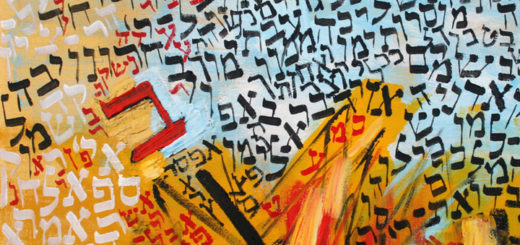Navy with God from a transgender perspective
Text by Joy Ladin* taken from his book "The Soul of the Stranger: Reading God and Torah From A Transgender Perspective"(The soul of the foreigner. Read God and the Torah from a transgender perspective), ed. Brandeis University Press (United States), 2018. Freely translated by the volunteers of the Gionata project
They often ask me how to reconcile my religious faith with the fact of being a transgender person. For me, there has never been a conflict between the two. From what I have memory, I have always heard I was a woman, and since I have memory, I have always felt the presence of God.
I learned to speak naturally of my being transgender, but despite everything, every time I speak of my relationship with God, I still feel uncomfortable in saying: "I feel the presence of God".
I grew up surrounded by people for whom God was only a vague idea: an empty word, an overcoming superstition, a target for anger resulting from the Holocaust and other tragedies, a symbol of ideals that are difficult to make for human beings.
Even in the Jewish and Synagogue school, I did not dare to leak that, for me, God was not an abstract concept, but someone who was there, invisible but real as the cold, the heat or humidity.
Nobody around me seemed to experience God as a living presence. But when I read the Torah, the Jewish Bible - what Christians call "Antico Testamento" -, I found that God.
Torah describes a god deeply involved in human lives, not only in those of extraordinary figures such as Abraham and Sara, but of all. God does not buy or sell, but asks humans to do it honesty. God has no parents, but worries how we treat ours.
God does not live in space or over time, it is not subject to famine or abundance, per day or night, birth or death, but wants us to give meaning to the seasons and places of our existence.
At the same time, Torah is clear in saying that although God is present and personally involved in our lives, it is not a human being. God has no face, form, neither beginning nor end, and cannot be understood in the terms with which we understand ourselves and the world. As God says to Moses in the ardent Roveto: "I am the one who are, and I will be the one I will be" (Exodus 3,14).
This God, invisible, incomprehensible yet undeniably present, is the God with whom I grew up. Not because my family was religious (it was not), not because we read the Torah together (we did not do it), not because teachers or spiritual guides had educated me to think of God in this way (they had not taught me to think of God at all). Yet, from what I have memory, this was the God I woke up and with whom I fell asleep, the God I whispered, cried, I begged and, sometimes, screamed.
For me, God was not a mystical experience: it was a daily reality, like my parents. But I felt closer to God than to my parents. Like the other human beings, my parents identified me with my male body.
For them I was a boy named Jay and, both because I loved them and because I was terrified of the idea of being rejected if they had discovered the truth, I did my best to behave like the son they thought they had.
God, on the other hand, never confused me with the body that the others saw. God knew who I really was and understood how alone I felt, because God, like me, did not have a body visible to human beings.
Apart from the genre, I was not so different from other children. Like them, I ate, I slept, I went to school, pedaling on my bicycle, I played, I was self -centered and sometimes cruel, not very attentive to the truth and feelings of others.
Even if I knew that the appearance I showed outside did not correspond to who I was inside, I still judged the others by the color of the skin, from the shape of their bodies, from the transavingness or elegance of their clothes. And I was taken for granted that, unlike me, the others were really the boys or girls, men or women who seemed to be.
Yet, despite the many similarities with other children, I have always felt that I am something else, something that had no name or a place in the world. Today I would say that, not by returning to gender binarism that defines everyone as male or female, I could not feel part of humanity.
As a child, however, I only knew that my feeling female made me different in ways that were shameful and dangerous, ways that prevented others from seeing me, understanding me and love me. Present but invisible, I felt a ghost, hidden inside and prisoner of the boy who everyone believed I was.
Obviously, none of us is exactly what it seems. Few, reflecting us, would say that their body perfectly expresses who they are or that they always feel in line with the expectations of others. The genre and other identities are always compromised, which force us to sacrifice part of our individuality to adapt to our families, friendships and communities.
But for me, when it was a gender, that compromise was not possible. I could, and I did it, behave like the boy that the others saw, but I couldn't hear it really.
I could not identify myself with the other boys, nor to feel really present in relationships, because each relationship was based on the genre. I was not just my parents' daughter: I had to be their son. I was not just a child in the neighborhood: I had to be one of the boys.
I was not just a Jewish person: I had to be a male Jew. And so, despite being surrounded by people who believed they knew me, I grew up feeling invisible, frightened and alone.
But I was alone with God.
Everything that separated me from the others - my body that did not belong to me, the inability to return to the gender categories, to feel so radically different - made me feel closer to God.
God knew who I was and what I was. God had created me, combining a body and a soul that seemed not to match. God was always there, day and night, while I was trying to live and, sometimes, to die.
We were a strange couple: I, struggling with a body that I don't feel mine, and God, who existed beyond all time and space. But there was something that united us: neither I nor God could be seen or understood by those who surrounded us and loved us.
And so, since I have memory, my being transgender has always approached me to God.
* Joy LadinHe is an American poet and essayist, known for having been the first openly transgender teacher in an Orthodox Jewish institution. He has published twelve books, including the autobiography "Through the Door of Life: A Jewish Journey Beteween Genders" (2012) and "The Soul of the Stranger: Reading God and Torah from Acturender Perspective" (2018). His works explore issues related to gender identity and spirituality, offering a unique perspective that combines personal experience and literary analysis.
Original text: Introduction Shipwrecked with God






